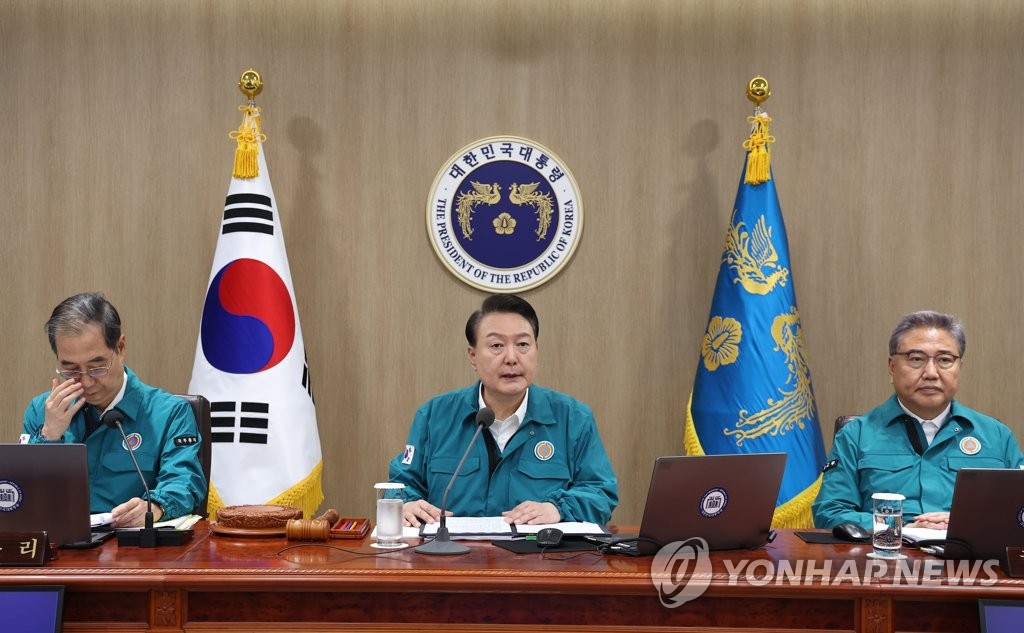- California Assembly OKs highest minimum wage in nation
- S. Korea unveils first graphic cigarette warnings
- US joins with South Korea, Japan in bid to deter North Korea
- LPGA golfer Chun In-gee finally back in action
- S. Korea won’t be top seed in final World Cup qualification round
- US men’s soccer misses 2nd straight Olympics
- US back on track in qualifying with 4-0 win over Guatemala
- High-intensity workout injuries spawn cottage industry
- CDC expands range of Zika mosquitoes into parts of Northeast
- Who knew? ‘The Walking Dead’ is helping families connect
Yoon says N.K. threat will only make S. Korea-U.S.-Japan cooperation stronger
President Yoon Suk Yeol said Monday that increased threats of provocation from North Korea will only strengthen security cooperation among South Korea, the United States and Japan.
Yoon made the remark during a Cabinet meeting at the presidential office, a day after he returned from a trilateral summit with U.S. President Joe Biden and Japanese Prime Minister Fumio Kishida at the Camp David presidential retreat in Maryland.

“The larger North Korea’s threats of provocations become, the more solid the structure of trilateral security cooperation among South Korea, the U.S. and Japan will become,” Yoon said.
“These structures of trilateral cooperation will lower the risk of North Korea’s provocations and further strengthen our security,” he added.
The first stand-alone summit among the three countries’ leaders produced a series of agreements on bolstering security and economic cooperation, including a “commitment” to immediately consult one another in the event of common threats and an agreement to hold annual trilateral defense exercises.
The three leaders also agreed to hold trilateral summits at least annually and operationalize the real-time sharing of missile warning data on North Korea before the end of the year.
“From now on, cooperation mechanisms among South Korea, the U.S. and Japan will function as powerful cooperation mechanisms promoting peace and prosperity in and outside the region, together with AUKUS and Quad, and continue to expand and develop,” Yoon said, referring to the trilateral security pact involving Australia, Britain and the U.S., and the Quadrilateral Security Dialogue involving the U.S., Australia, Japan and India.
“Once South Korea, the U.S. and Japan connect the supply chain early warning systems they have been operating individually until now, our supply chain information and resilience level will improve dramatically,” he added.
Monday’s Cabinet meeting was also held to discuss the Ulchi civil defense exercise that kicked off the same day for a four-day run.
The annual exercise was fully reinstated last year after being scaled back under the previous administration and will involve some 580,000 officials from about 4,000 central and local government agencies and public institutions to check and enhance readiness for war and other contingencies.
Yoon called for readiness against what he said would be North Korea’s attempts to sow severe social confusion and division in the event of war through the distribution of fake news and the mobilization of anti-state forces for propaganda.
He also warned of North Korea’s likely attempts to paralyze national infrastructure through attacks on nuclear power plants, cutting-edge industrial facilities and national telecommunication networks.
“In order to achieve its goal in war, North Korea will fully mobilize all available means and will be willing to use nuclear weapons,” Yoon said, noting that starting this year, the Ulchi exercise will include a government-led drill on responding to a potential North Korean nuclear attack.
The civil defense drill is part of a South Korea-U.S. joint annual military exercise, called the Ulchi Freedom Shield, which will run until Aug. 31.
Yoon presided over a National Security Council meeting before the Cabinet session and stressed the importance of the allied drills, according to presidential spokesperson Lee Do-woon.
“True peace is defended not by one-sided begging or good will, but only by overwhelming strength,” he was quoted as saying. “North Korea talks of preemptive nuclear attacks and offensive war preparations, but we will immediately and overwhelmingly punish any provocation from North Korea.”











